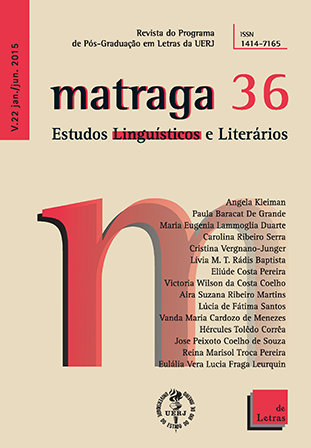EDUCATIONAL TECHNOLOGY AND DIGITAL LITERACY IN PUBLIC SCHOOLS: SOME ODD MAN OUT?
Keywords:
Educational Technology. Multiliteracies. Digital literacy.Abstract
The studies about literacy have pointed to the necessity of reconsidering the ontology and paradigms that are related to the comprehension of several literacy practices, their relationship with the subject in the contemporary society as in the case of the practice that involve technologies and digital resources in scholar environments. Thus, aiming to investigate how the digital literacy has been introduced in the teaching of languages, in the scope of basic education, a survey in a public school was conducted. Such survey was a case study in which the relationship between different conditional contexts of digital literacy insertion was evaluated like, for example, the prescriptive and directive; the infrastructure; the teacher background and, at the end, the practices themselves. The theoretical foundation to conduct this survey relied on the novel studies on literacy (PAHL & ROWSELL, 2012), the presumptive literacy as social practice (STREET, 1984, 2003; LANKSHEAR & KNOBEL, 2006, 2011) and the pedagogic proposal of multi-literacy (CAZDEN et al., 1996; ROJO, 2009, 2012), especially in relation to the conception of digital literacy (MARTIN, 2008). Summarily, in our present work, we examined two of these cited contexts, namely, the prescriptive/directive and the practices, from which the analysis has allowed the following aspects to be observed: lack of consonance between these contexts; minimal insertion of the digital literacy in the scholar curriculum; incipient and very punctual insertion of these literacy practices; additionally, these contexts did not take into account the socio-discursive and interactive experiences from the students outside the school.
Downloads
Downloads
Published
How to Cite
Issue
Section
License
Authorization
Matraga – Scientific Journal of the Post-graduate Program in Arts and Humanities of UERJ is authorized to publish the article submitted here, if it is accepted for online publication. It is attested that the contribution is original, that it is not being submitted to another publisher for publication, and that this statement is the expression of truth.
The works published in Matraga's virtual space – Scientific Journal of the Post-graduate Program in Arts and Humanities of UERJ will be automatically transferred, and your copyright is reserved to Matraga. Its reproduction, in whole or in part, is conditional on the citation of the authors and the data of the publication.

Matraga uses license Creative Commons - Attribution-Non-Commercial 4.0 International.





